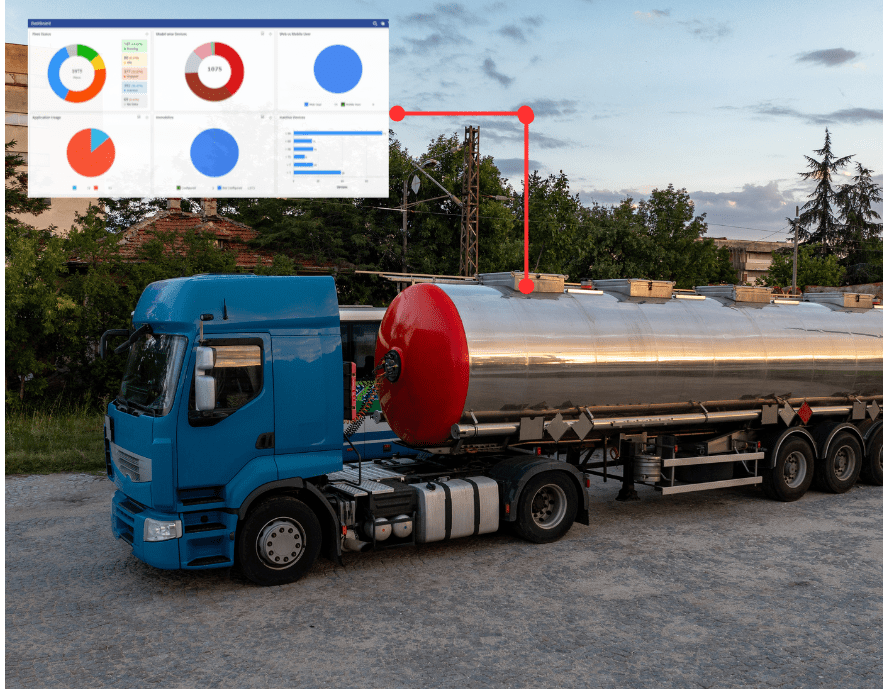February 21, 2025

In India, edible oil is one of the most essential staple products, manufactured largely by big companies and distributed across the country through legacy supply chain networks, modern retail, and e-commerce platforms. While national brands enjoy widespread recognition, strong regional brand dominance exists across various parts of India.
Why focus on edible oil transportation? The key to market dominance isn’t just superior product quality but also seamless availability. In today’s competitive landscape, ensuring fulfillment at every touchpoint of the distribution network is critical, and digitization plays a pivotal role in achieving this.
Since edible oil falls under the category of fast-moving consumer goods (FMCG), SKU (Stock Keeping Unit) management plays a vital role in ensuring effective product placement and supply chain efficiency. Transportation costs significantly impact cost rationalization, making logistics optimization an essential requirement.
The Answer: A Unified Logistics Platform
The solution is both simple and complex. The simple part? Using data and workforce efficiently. The complex part? Driving adoption and change management.
A Unified Logistics Platform acts as the central nervous system of logistics operations, integrating multiple modules that simplify and automate logistics workflows.
This platform is tightly linked to a company’s ERP system, extracting data, applying intelligent logic, and enabling the operations team to execute tasks more efficiently.
While the advantages of digitization are clear, the real challenge lies in adaptation. Transforming traditional logistics processes requires a cultural shift, training, and the right support system to ensure smooth adoption.
This is where companies like Spinclabs step in. We not only provide technical solutions but also guide businesses through the transformation journey with a structured approach to change management.
Our customer success team ensures stakeholders across the hierarchy feel comfortable with new systems, bridging the gap between technology and human adaptation.
Implementing a Unified Logistics Platform isn’t just about operational efficiency—it’s about market leadership. By streamlining logistics, reducing costs, and improving fulfillment rates, companies can enhance availability, build a stronger brand presence, and meet growing consumer demands with agility.
The brands that adapt to digitization today will define the future of edible oil distribution in India.
The question isn’t whether you should digitize—it’s how fast you can adapt. Are you ready to take the leap?
"Have you ever lost your way inside complex spaces such as a hospital, airport, or…
Read More“Tired of getting lost in maze-like hospital complexes? SpincLabs’ curated guide about ‘Indoor Navigation Systems’…
Read More“The only momentum you should gain for your business is growth and scalability. Don’t let…
Read More" Indoor navigation helps you where your GPS doesn’t. Yes, it is tough for satellite…
Read More“Is your fleet management strategy stuck in the past? Nowadays, fleet management uses advanced technology,…
Read More"Are your shoppers wandering aimlessly in your shopping mall to locate their favourite store? Do…
Read More"Do you think the phrase ‘Fleet Management’ stands for managing trucks? You are not alone.…
Read More"In the world’s largest archipelago, Indonesia, managing logistics often becomes a puzzle. Connecting each island…
Read More“Have you ever wondered how to track vehicle location with GPS and how does this…
Read More“Tired of tedious, unreliable manual vehicle inspections? SpincLabs’ curated guide gives you the power of…
Read More“Is your fleet management stuck in the past? This curated guide from SpincLabs will shed…
Read MoreWhy does it feel like your logistics budget has a secret escape plan? One minute,…
Read MoreIn India, edible oil is one of the most essential staple products, manufactured largely by…
Read MoreThe digitization process has been rapidly accelerating, particularly in recent years with the mass introduction…
Read MoreIn the heart of the UAE where global trade routes converge, a revolution is underway.…
Read MoreThe world is going green, and transportation needs to catch up. In Dubai, where the…
Read MoreIn today’s fast-paced logistics world, fleet management software is evolving beyond basic GPS tracking. With…
Read MoreTechnology is transforming logistics in a profound way, making it one of the largest users…
Read MoreThe logistics landscape is evolving rapidly, with technology transforming every facet of the supply chain.…
Read MoreIn today’s fast-paced business environment, the ability to deliver goods efficiently and accurately is paramount.…
Read MoreLogistics is a department often seen as disorganized and neglected when it comes to digitization,…
Read MoreEvery logistics service provider is deeply involved in numerous operational activities and the handling of…
Read MoreIn today's fast-paced world, where consumer needs are constantly evolving, transport owners are working tirelessly…
Read MoreThe Open Network for Digital Commerce (ONDC) is a groundbreaking initiative by the Government of…
Read MoreWhat is ULIP? The Unified Logistics Interface Platform (ULIP) is a major initiative under PM…
Read MoreShipment visibility, a term that’s becoming increasingly significant in logistics, refers to the ability to…
Read MoreTransport Management Solutions can be challenging for any enterprise involved in manufacturing or distributing goods…
Read MoreTransportation has been integral to human civilization for centuries. Goods have been transported on donkeys,…
Read MoreTransport management solutions are essential for running a smooth and efficient business that relies on…
Read MoreFleet management solution are really important for any business that uses vehicles. They help you…
Read MoreThe realm of logistics poses multifaceted challenges, each requiring a nuanced solution. These challenges span…
Read More